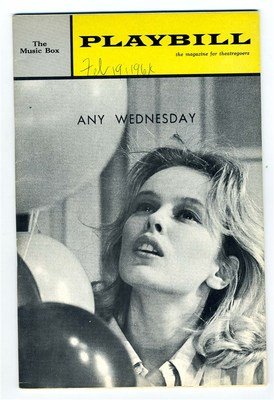Before The Parade Passes By
Peter Filichia has been writing about the Great White Way for decades. If he doesn't know something about Broadway, it's not worth knowing. I enjoyed an earlier work about the biggest hits and flops of various years, so I decided to check out his latest, The Great Parade: Broadway's Astonishing, Never-To-Be-Forgotten 1963-1964 Season.
I have a problem from the start--while that year might be important to Filichia, I don't see why it stands out. It seems to me you could write a book about any 12-month period--as William Goldman did with classic The Season, where he went in-depth into 1967-1968.
So what evidence does Filichia have that this year was so significant? None, really. He just assumes it was. Sure, there were huge hits--Hello Dolly!, Funny Girl, Barefoot In The Park--but every year features a few hits, more middling runs, and plenty of flops (only 11 of 75 productions made money that season). So really, to enjoy this book, you can't argue with it, you've got to go along with it.
Luckily, that's easy enough. He separates the shows into musicals, comedies, dramas, revivals and a few odds and ends. And he discusses pretty much all 75 productions that season. The text is 260 pages, so plenty of the shows get at least a few pages. While we may already know about the blockbusters, there are great stories about some of those that didn't make it.
For instance, Filichia goes into detail about the musical Fade Out--Fade In. With book and lyrics by Comden and Green, music by Jule Styne and direction by George Abbot, there's no reason it couldn't have been a hit. And it looked like it would be. But star Carol Burnett wanted out for a number of reasons (she was injured, she wanted to be on TV, she felt Styne was paying more attention to Barbra Streisand in his other show Funny Girl). She offered to buy herself out of the show. Instead, the producer forced her to fulfill her contract. No one wants to see a musical where the lead is performing at gunpoint.
Another musical, What Makes Sammy Run?, had a similar problem. It featured pop star Steve Lawrence. It turned out he could act as well as sing, and the production drew crowds, but Lawrence got tired of it and moved on, leaving behind a show in red ink.
Hits could be just as unexpected. There were shows featuring huge Broadway stars, such as Robert Preston in Nobody Loves An Albatross or Mary Martin in Jennie, that lost money. (A few years later the two would work together in the hit I Do! I Do!.) For that matter, movie star Kirk Douglas returned to Broadway in an adaptation of One Flew Over The Cuckoo's Nest that flopped. But then an unheralded production like The Subject Was Roses, a three-character drama with little action and no big names (at the time), would open and run for two years, winning the Tony for Best Play as well as a Pulitzer Prize. (The show hasn't held up, I'd say. You don't see many revivals.)
Even better is the story of Any Wednesday, a comedy that was a disaster out of town. It shed actors and directors like rats off a sinking ship. And yet, once it opened, the critics were captivated by lead Sandy Dennis, and the public loved it so much it ran for two and a half years. (It hasn't dated well either, just like most sex farces of the period.)
Filichia brings many of these long-forgotten titles back to life. His style can be a little too informal and cutesy, and occasionally he makes political statements that are generally pointless and sometimes idiotic, but he knows what he's talking about and has plenty of good anecdotes. It's a shame he thinks 1963-1964 is so special, since it would be fun to have him do it for as many years as he's willing.




1 Comments:
Maybe this is the first of a 40 book series?
Post a Comment
<< Home